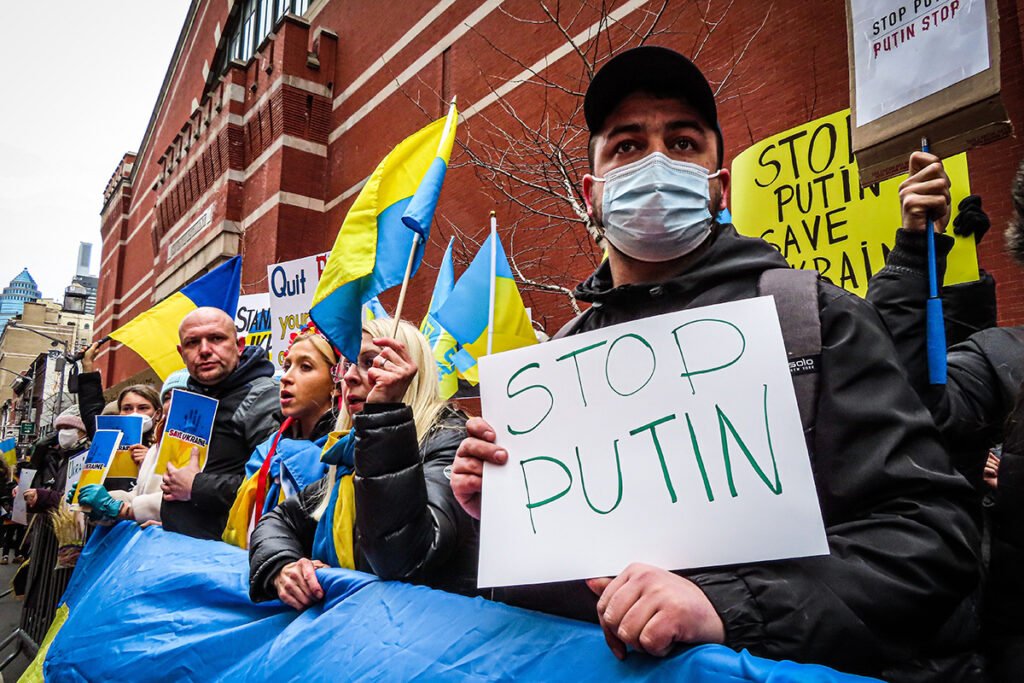McManus on Economic, Geopolitical Effects of Russia’s Invasion of Ukraine

Ian McManus, assistant professor of political science in the Marlboro Institute for Liberal Arts & Interdisciplinary Studies, spoke to Emerson Today about Russia’s invasion of Ukraine. McManus’ focus of work includes economic crises, labor markets, European politics, comparative politics, international relations, and the political economy.
Q: What classes are you teaching this semester?
McManus: I’m teaching at the L.A. campus: International Social Policy, which is about welfare politics around the world, and Politics, Media and Art. In the latter class we were already exploring the intersection of politics and media, and looked at the phenomenon of post-truth media information. In this context, we looked at what’s happening with the conflict in Ukraine, and the Russian propaganda campaign to promote false information, that under even the smallest amount of scrutiny, falls apart.

Q: Have you been to Russia or Ukraine?
McManus: My wife is Ukrainian, and moved to the U.S. at a very young age. I’ve traveled around Ukraine, and she still has family there. The whole country is under siege, and I’ve been to a lot of places that are under attack.
It’s pretty frightening. Most of her family members are in the west of the country and some are looking to flee. Some cousins are in the military, and one of them is stationed right outside Kyiv, and really on the front lines of this conflict.
Q: What are your initial thoughts on Russia invading Ukraine?
McManus: It is an unprovoked attack on peaceful democratic people. The justification for going into this conflict is not even flimsy, it’s unwarranted. And I think the reality is Vladimir Putin wants a greater sphere of influence and control over Ukraine, and he has shown he’s willing to do whatever it takes to achieve that.
Q: What is the proper term to call it? Invasion? War? Conflict?
McManus: In terms of news framing, it’s a full-scale invasion, because it’s clearly an invasion. Russia has a history of more limited covert operations, like Georgia in 2008, Crimea in 2014. Russia sent in troops and annexed Crimea, and part of the campaign was done under the guise of a veil of misinformation, but was more limited in scope. I think a lot of media is referring to this as a fully mobilized Russian military force going into Ukraine from multiple fronts.
Q: Is this invasion a surprise or was Putin signaling it for years?
McManus: In some ways this conflict has been going on since 2014, when Russia went in and annexed another part of a sovereign nation and said, ‘This is my land now’. There were Russian-backed separatists, and it was a low-level conflict.
What’s more surprising and unprecedented now is this large scale military buildup, and overt use of force. When thinking about what’s happened over the last several days, in some ways it’s not surprising, but it’s shocking. You see this clear use of military force in the current conflict whereas in the past Russia has preferred more covert or limited engagements. This kind of brazen full-scale war effort surprised many people. Vladimir Putin has demonstrated a shocking willingness to use military force, and not just on strategic military targets. Civilian centers have been hit, too.
Q: What do you think will be economic effects of this war?
McManus: The answer is this is really bad across the board. Clearly in the case of Ukraine, you’re going to see devastation of their economy and infrastructure. The thing that should be mentioned, too, is looking at Putin’s regime, it’s bad not just for Ukraine, it’s bad for Russian people. The average Russian person is disadvantaged by Putin’s authoritarian and oligarchic regime and the average Russian person is going to be hurt by sanctions. It creates global instability. Look at how you’ve seen the Russian ruble dropped off a cliff in monetary value. There’s a volatility to economic markets, and the rising cost of gasoline will hit the average American, as well as increase costs for global supply chains. It’s going to cause harm across the board, with certain countries and certain people bearing a greater burden of that.
Q: What do you think is Russia’s goal?
McManus: Putin has made his goals pretty clear. He said the collapse of the Soviet Union was the worst disaster of the 20th century. He wants a revived Russian empire. He wants Russia, which has been diminished on the global stage, to be a super power again.
Looking at Ukraine, prior to this point in time, it has had to fight for its independence three times already. It gained independence in 1991. In 2005, there was a pro-Russian government that was notorious for corruption and a lack of transparency that was ousted in a popular uprising. After that, a Russian puppet regime was in place in 2014, and Ukraine people rose up and overthrew this government and said they wanted greater economic ties with the West and democracy.
I think at the end of the day, Putin has tried repeatedly to bring Ukraine into Russia’s orbit. But the thing is, he doesn’t have much to offer Ukraine. A lot of young Ukrainians, say, ‘We want democracy, we want peace and prosperity.’ They look at the West and say, ‘This is an opportunity for us.’ By contrast, Russia can’t offer a carrot, so it’s using its stick. I think Putin’s aim is to try to install a pro-Russian regime to create a buffer for Russia against the West.
Q: Will Russia look to invade the other sovereign nations that were part of the USSR?
McManus: In some cases, you see Belarus already has an authoritarian pro-Russian regime. Putin has an ally there. The issue is when it comes to NATO. NATO is a defensive pact, and its Article 5 says an attack on any member is an attack on every other member.
Ukraine at the end of the Cold War, and with the collapse of the Soviet Union, was never formally brought into NATO. It existed in a grey zone which has allowed Putin to more boldly go in. I would suspect Russia would be far more reluctant to go into a NATO member which would trigger other NATO members to react. There’s a couple of non-Soviet states, but non-NATO members. He’s talked about how Finland and Sweden better not join NATO. He’s threatening to stop any enlargement of NATO. He sees NATO as a threat to his visions for the future of Russia, globally. I think it’s unlikely he goes into a NATO member.
Q: What would he do to Finland and Sweden?
McManus: I don’t see Russia invading Finland. [Putin] gave a speech on [February 24], and he reiterated that Russia is a nuclear power, and if you step into the Ukrainian conflict there will be an unprecedented response by Russia. He’s clearly trying to saber rattle and put that fear into any country to limit action.
You cannot just look at whether Ukraine was looking to have closer ties to Russia or the West. Really at the end of the day, peaceful prosperous democracies represent a threat to Putin’s regime. His country isn’t those things, he’s an authoritarian leader of a regime with tremendous state censorship and limitations on freedom. You have oligarchs with tremendous wealth and political power. And one of the largest militaries –the largest in Europe.
The idea of democracy, political representation, political freedom, and economic freedom is a threat to Putin’s rule. What’s interesting is we’ve seen this crisis in Ukraine is much broader economically, and politically, [it] is also a threat to global order. If you look there have been other Russian efforts to undermine the West in recent years: evidence of meddling in U.S. elections, and evidence of Russia providing financial and other support to far-right parties in Europe. Ultimately, to see democracy undermined and see Europe fragmented, these are things that Putin sees as a positive. He’s trying to undermine not just Ukraine, but the existing global order. It’s a much larger kind of threat posed to democracy and freedom.
Q: What are responses that the U.S. could or should take?
McManus: We’ve seen sanctions clearly weren’t enough to deter Russian actions and stop the invasion. In the long run they will hurt Russia and they’ll harm its economy and society. I think the biggest thing about Crimea is there were sanctions placed on Russia and over time they were scaled back. Russia took over this territory and claimed it as their own and held onto it since.
I think sanctions should be expanded. I also think the real critical piece of this is certainly the U.S., the West, and globally, resolve needs to be maintained, and that it’s not just about hitting Russia with sanctions, but also having resolve to continue and take a stand to say these kinds of actions are unacceptable. It’s clear the U.S. is not going to put boots on the ground and other NATO members are reluctant. We’ll see additional sanctions, and military and humanitarian aid going into Ukraine. This is likely to be protracted long-term conflict that will last weeks, months, years.
Q: Is there anything else?
McManus: There’s a concerted disinformation part to the reality of what’s happening. There needs to be recognition that the aim isn’t just a takeover of Ukraine. The aim really represents a challenge to Western ideals, allies, freedom, and democracy and economic prosperity. A democratic thriving peaceful Ukraine represents a threat to Russia. Look at where Poland was in 1991 versus where it is today. This sort of engagement between Poland and the West has been a tremendous value to development of the country and its people, and represents a model that is perceived as a threat.
One big piece is the humanitarian crisis of this conflict. There could be upwards of 1 million refugees, which is destabilizing to the region. There are very real human costs to this crisis. You have women, children, and old people huddling in subways. You can think about high-level diplomatic geopolitical concerns, and those are important to analyze. It is vital to understand the motivations of Russia, and the response of other countries, and that’s a really important conversation. However, in doing that, the conflict can become so abstract that we forget about the human costs of the invasion. You have this large-scale military operation coming in and they’re bombing civilian centers, and a lot of innocent people are going to die, and a lot of Russian and Ukrainian soldiers are going to die. Amongst the Russian population, they’re going to ask why does this have to happen? Why did my husband, friend, or daughter go to fight and die? The decisions made at the highest level of the Kremlin have a horrific effect on many people on all sides.
Categories